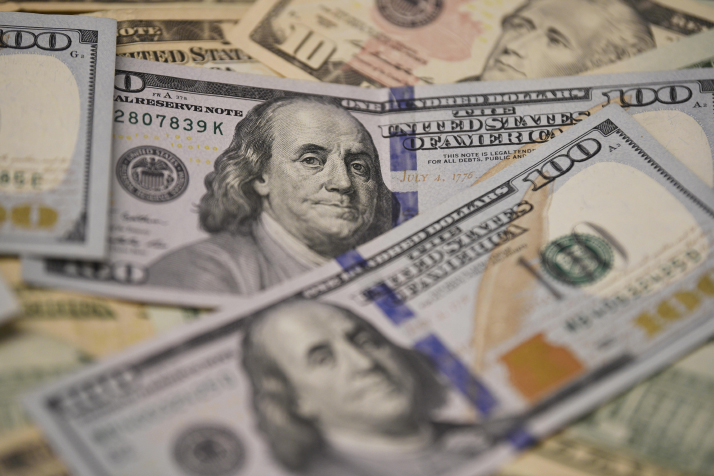| Business |
| Flexible Exchange | |
| The yuan is expected to remain stable despite recent depreciation | |
|
|
 A buyer purchases coffee at an import fair in Yiwu, east China's Zhejiang Province, on May 23 (XINHUA)
The central parity rate of the yuan weakened 43 basis points to 7.0039 against the U.S. dollar on August 8, closing lower for the sixth consecutive day and reaching a record low not seen since April 21, 2008. Three days earlier, both the onshore and offshore yuan weakened past the key psychological level of 7 per U.S. dollar. According to the People's Bank of China (PBC), the country's central bank, the weakening of the yuan can be attributed to U.S. unilateralism and protectionism as well as expectations of additional tariffs on Chinese goods. In the latest move, the United States has threatened to impose additional 10-percent tariffs on $300 billion worth of Chinese imports starting next month. Mounting downward pressure on China's economy and concerns over rising financial risks have also contributed to the currency's weakening, but the fall does not suggest that the yuan is headed for a dramatic drop because China's economic foundations are stable, Zhang Ming, chief economist at Pingan Securities, said. Since the country has adopted a flexible yuan exchange rate determined by market supply and demand, the 7 yuan per dollar mark is not a warning line but more of an average level, much like water level marks in a reservoir, which means both a rise and fall are the norm, the PBC highlighted in an online statement on August 5. Despite its weakening, the yuan will maintain its stability and strength against a basket of currencies. The central bank has the confidence and capability to keep the yuan exchange rate stable, it said. Breaching the mark As the central bank stressed, the yuan's exchange rate is determined by long-term economic fundamentals, although it has been influenced by market supply and demand as well as the dollar's strength in the short term. A new situation in the international economy, trade frictions and changing market expectations have led to the depreciation of many currencies against the dollar recently, affecting the yuan's exchange rate as well, PBC Governor Yi Gang said on August 5. The U.S. Federal Reserve's interest rate cut announced on July 31 has also triggered fluctuations in the international financial market. As Wen Bin, chief researcher at China Minsheng Bank, told Yicai.com, a Shanghai-based financial portal, changes in the yuan exchange rate have been greatly influenced by the market sentiment toward the U.S. interest rate cut. "Given mounting external uncertainties, the yuan's fall below the 7 mark is within expectations, and the currency's depreciation does not suggest an abnormal fluctuation in China's economy under the flexible exchange rate system," Lian Ping, chief economist with Bank of Communications, told Beijing Review. According to Yan Se, an associate professor with the Guanghua School of Management at Peking University, the weakening of the yuan reflects the effectiveness of China's efforts in the market-determined exchange rate system. Since 2005, to open up the domestic market, the country has adopted a managed flexible yuan exchange rate that ties the yuan's value to a basket of currencies, allowing its value against the dollar to fluctuate in a band around a daily reference rate. On August 6, the U.S. Treasury Department labeled China a "currency manipulator" for the first time since 1994, extending the trade friction beyond tariffs. Refuting the U.S. allegation that the weakening of the yuan falls in the scope of currency manipulation, the central bank highlighted that China has never resorted to competitive devaluation and will not use the currency as a tool to deal with trade disputes. The yuan has remained stable from a broader perspective. According to the central bank, the yuan's nominal exchange rate appreciated 38 percent and its real exchange rate rose 47 percent from the beginning of 2005 to June. The currency has strengthened 20 percent against the dollar over the past two decades despite recent weakening, which makes the yuan the strongest among major currencies in the world. Since the start of the year, the yuan has strengthened against a basket of major currencies. The China Foreign Exchange Trade System RMB Index, which compares the Chinese currency to the value of 24 currencies such as the dollar and the euro, has risen by 0.3 percent. The yuan's exchange rate has been supported by China's sound fundamentals, strong economic resilience, stable fiscal performance, controllable financial risks, balanced cross-border capital flow and sufficient foreign exchange reserves, the PBC said. The International Monetary Fund's annual report released in July also indicates that the yuan exchange rate was broadly in line with fundamentals. Data from the State Administration of Foreign Exchange showed that China's foreign exchange reserves jumped $31 billion since the beginning of the year to $3.1 trillion at the end of July. According to Lian, the yuan exchange rate will not see continuous and significant depreciation due to China's stable economic growth and monetary policies, which have an effect on the exchange rate.  A photo of dollar notes taken in Washington, D.C. on July 31 as the U.S. Federal Reserve lowered interest rates for the first time since the 2008 global financial crisis (XINHUA)
Stable momentum Although the yuan's depreciation can be a boon for export-oriented enterprises, benefits may also be accompanied by risks. According to the central bank, growing fluctuations in the yuan exchange rate mean both appreciation and depreciation are likely. Therefore, domestic enterprises are still supposed to focus on their original businesses instead of the trading of foreign exchange derivatives. It is clear that the currency's weakening beyond the 7 yuan per dollar mark will not deal a blow to the life of the people in China as the yuan has seen more appreciation against the dollar and a basket of currencies than depreciation in the past decades, with people's purchasing power for foreign services and goods rising. Downward pressure on the yuan may bring yuan-denominated assets under pressure, while it also indicates the market's expectations for policy easing, Hong Hao, Managing Director and head of research at BOCOM International, said. As Shao Yu, chief economist at Shanghai-based Orient Securities, highlighted, the current priority for China is to maintain the flexibility of the yuan exchange rate, which can promote exports and reduce asset bubbles. The country also needs to adopt flexible measures to ease pressure on domestic export-oriented enterprises and stabilize employment amid rising external uncertainties, Yan said. According to Wen, it is not necessary to pay too much attention to whether the yuan's exchange rate is higher or lower than 7 yuan per dollar because the yuan exchange rate index remains stable. Meanwhile, the dollar index may continue to fall. The drop of the dollar index can help make the yuan's exchange rate to the dollar stable, which will remain close to 7 in the short term, Zhang analyzed. "From the second half of this year to next year, domestic demand driven by investment and consumption will remain stable under the counter-cyclical policy, which can help ensure the stability of the yuan's exchange rate," Lian said. As the central bank predicted, China is likely to become a magnet for global capital since it is the only major economy that has maintained a stable monetary policy as many developed economies have loosened monetary policies. Copyedited by Madhusudan Chaubey Comments to lixiaoyang@bjreview.com |
|
||||||||||||||||||||||||||||
|